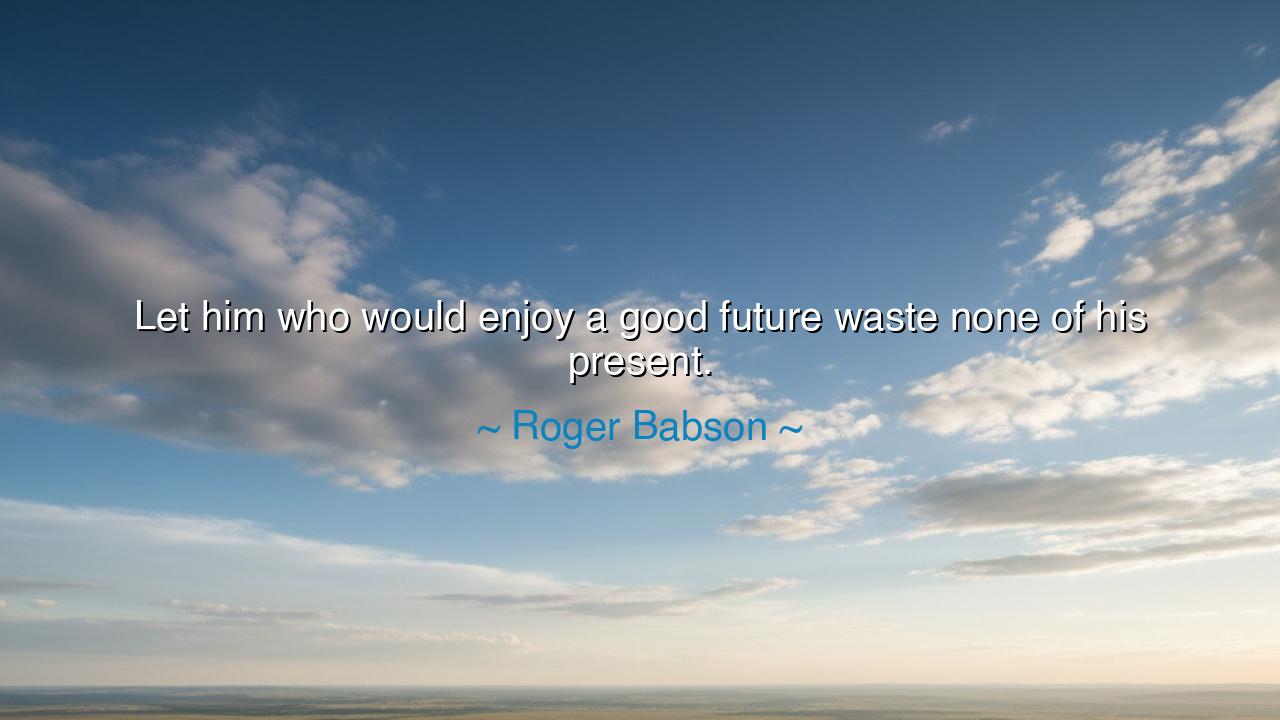
Let him who would enjoy a good future waste none of his present.






"Let him who would enjoy a good future waste none of his present." Thus spoke Roger Babson, a man whose life straddled the worlds of commerce and spirit, of calculation and conscience. His words rise like a quiet bell across the ages, a call to awaken the soul that slumbers amid the comforts of idleness. For the future—that golden horizon which every heart seeks—is but the shadow of today’s labors, the harvest of our present sowing. To waste the present is to cast away the seed from which tomorrow’s joy must grow.
In the ancient days, wise men of many lands understood this truth. They knew that time is the one treasure that cannot be hoarded, cannot be recalled once spent. The Stoics of Rome taught, "While we delay, life speeds on." The sages of the East said, "He who neglects the hour is like a farmer who lets the rain fall upon barren ground." For every moment of today is sacred, alive with possibility. Those who spend their days in idleness, waiting for fortune to smile, discover too late that the future they dreamed of has passed them by, unbuilt, unearned, unfulfilled.
Consider the life of Benjamin Franklin, a man of humble birth and tireless discipline. While others slept, he worked by candlelight; while others talked, he studied, wrote, and experimented. He did not waste the dawn or the dusk. And by his diligence, he rose from a poor printer’s apprentice to a statesman and philosopher of renown. Franklin understood that the present moment was his workshop, his field of endeavor. He did not pray for a good future—he built it, stroke by stroke, hour by hour. His life became a living testament to Babson’s truth: no future can bloom unless the present is well-tended.
Yet there is a deeper current beneath this saying, one that touches the heart as much as the mind. To waste the present is not merely to squander time—it is to betray the gift of life itself. For the present moment is all that truly exists; it is the meeting place of past and future, the heartbeat of eternity. Each second carries within it the power to change a destiny. When one delays action, when one hides behind excuses, the divine spark of creation dims. But when one rises, when one acts with courage and purpose, the heavens themselves seem to move in harmony.
Let us remember also the story of Emperor Marcus Aurelius, who wrote in his Meditations amidst the burdens of empire and war: "Waste no more time arguing what a good man should be. Be one." These words, like Babson’s, summon the soul to immediate action. For greatness is never born in tomorrow; it is conceived in the fierce stillness of now. The emperor, beset by duty and sorrow, did not surrender to delay. He lived each day as if it were his last, and thus carved a legacy of wisdom that still burns bright across centuries.
From these examples we learn: the present is the anvil, and the future is the blade we forge upon it. To shape a life of beauty and strength, one must strike now—decisively, bravely, with faith in the unseen. Waiting for the perfect moment is folly, for perfection is born only through the imperfection of effort. As the old proverb says, “He who would move the mountain begins by carrying away small stones.”
Therefore, my listener, let this be your guiding star: Waste none of your present. Do not let hours slip like sand between idle fingers. Rise early to your purpose; set your mind upon your task; and cherish each moment as sacred ground upon which your future will stand. Whether your dream be humble or grand, it is the steady flame of daily effort that shall bring it to life.
And when your days are done, may you look upon your life not with regret for time lost, but with the calm joy of one who used each moment well—who built the future not by wish or by chance, but by honoring the present as the very breath of destiny.






AAdministratorAdministrator
Welcome, honored guests. Please leave a comment, we will respond soon